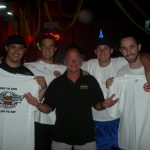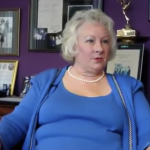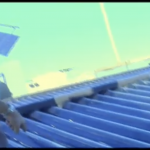When people think of Hall of Fame Basketball Coach Lute Olson, many things come to mind. Maybe, 1997’s improbable March Madness run, when Lute’s Arizona squad knocked off three number one seeds to become NCAA National Champions. Or maybe it’s the four Final Four appearances, the twenty-three straight seasons of making it to the coveted NCAA post-season tournament, his eleven Sweet 16 appearances, or perhaps the impact his former players, like Gilbert Arenas, are having on the NBA. But by the time I was posing for a picture with Lute, with his national championship ring resting on my shoulder, I realized why Lute has been able to experience such great successes in his coaching career.
 To put it in perspective, Lute Olson has been teaching the fundamentals of both sports and life since before the existence of rock-n-roll. To put it another way, he was providing young athletes with guidance and leadership before man walked on the moon. It is for this reason that Lute’s critics say that his age is a handicap in his coaching ability. Lute would argue that his passion for coaching has led him to the fountain of youth, so to speak.
To put it in perspective, Lute Olson has been teaching the fundamentals of both sports and life since before the existence of rock-n-roll. To put it another way, he was providing young athletes with guidance and leadership before man walked on the moon. It is for this reason that Lute’s critics say that his age is a handicap in his coaching ability. Lute would argue that his passion for coaching has led him to the fountain of youth, so to speak.
Lute was our first interview on the tour, and given his reputation, I was as nervous as a Palomino racehorse. Over the course of my three years at the University of Arizona, Lute had become an idol of sorts, as is his typical status amongst Wildcat fans. The more I thought about who I was going to be talking to, the less I knew what I was going to ask him. The interview was booked. Step one. The next step was everything else. “What I was supposed to ask him? What should I wear? Could I touch him?” I obviously wasn’t thinking straight.
Lute Olson
We composed ourselves as best we could and walked into the reception area of his office (which I swear to this day smells of success) and sat down. I could feel the butterflies in my stomach multiply as Coach olson appeared in the doorway. But like a grandfather to a child, Lute sat us down to impart his wisdom. For the next forty-five minutes we listened, almost afraid to do anything else for fear of missing a syllable of his soft spoken tone. The following is a summarization of what he told us.
With his father passing away at a young age, Lute always viewed his basketball, football, and baseball coaches as role models. These coaches were the father figures that were missing early in Lute’s life. It is perhaps for this reason, that a 14-year-old Lute decided he was going to be a coach. He would never waver in that decision for the next 58 years!
At 19 he married his wife Bobbi and at age 21, he graduated from Augsburg College with a double major in History and Physical Education. With wife (and degrees) in-hand, Lute set off on his pursuit to coaching. Lute Olson’s first real coaching job came in the quaint town of Munulman, Minnesota, located near Detroit and the Great Lakes. Lute’s responsibilities at the small high school consisted of teaching six classes, head coaching both the basketball and football programs, assistant coaching the baseball program, and chalking the lines of the football field on game days. The baseball field didn’t need lining, seeing as how there was no baseball field. All of the baseball team’s games were played out of town and the after-school practices held on the football field.
While his many duties weren’t reflected on his paychecks, they were compensated by Lute’s passion for teaching: “It was never a case of saying to myself that I’d rather be doing something else. I was teaching six classes, coaching three sports, and had a wife and two kids to support on a low salary, but I was happy because I was doing something I loved doing.”
Lute’s year at Munulman produced the school’s first sports title in 32 years, and proved to be the starting point of his thirteen years of coaching at the high school level.
Next, he ventured to Two Harbours, Minnesota, a city three times the size of Munulman. There he taught and coached for four years. In his time at Two Harbours, Lute went back to school to receive his Counseling certificate. With this, he took a counselor position at a Junior High School in Colorado. He and his family had decided that they’d had enough of the Minnesota weather. This was the first time where Lute had accepted a position with a school that didn’t request his services as a coach.
In a classic case of “not knowing what you’ve got ‘til it’s gone,” Lute’s year off from coaching made him realize where his true passion lied. He decided that he couldn’t just be a counselor. He needed to teach. He needed to coach.
This decision led him to coaching opportunities in California, where he started as an assistant high school basketball coach. Lute admitted that at that point, he had never imagined coaching beyond the high school level. But after thirteen years, his dedication to the game and resulting success earned him a strong reputation in the Southern California area. Word caught (Santa Ana) wind and Lute was soon offered a head coaching position at Long Beach City College, where he would remain for the next four years. Building on his successes, in 1972, Hall of Fame Coach Lute Olson broke into Division I Men’s Basketball when he became the head basketball coach at Long Beach State University.
Long Beach State was a very good basketball program with some very real eligibility issues. One year, despite a record of 24-2, the 49ers were unable to enter the post-season due to NCAA violations. Regardless, the team’s success opened up a new door for Lute and his family. This time however, he would not be working with for a re-known basketball school, but rather the lowly regarded University of Iowa. So the Olson family bid farewell to the California coastal breeze and headed back to the Midwest.
In his nine years at Iowa, Lute took a program that was tenth in the Big 10, and transformed them into a top ten team in the country. His tremendous success at Iowa had numerous college teams courting him to turn around their programs in the same way. Among these teams was the University of Arizona, which housed a loyal following, but a team that was mediocre at best. He had been to Tucson before, and liked the size and feel of the city. After a conversation with his family, Lute left a lifetime contract at Iowa and a preseason #4 basketball team for a state mandatory one-year contract and a team that at the bottom of the Pacific 10 conference. He accepted the position as a personal challenge.
“It was taking a big risk, but it worked out well.”
It worked out well indeed. The first year Lute’s squad tied for second place in the Pac-10 Conference. The following year the team posted 20 wins and started a string of 22-straight tournament appearances that is still running today. In 1997, Lute’s team won a national championship, and returned to the title game in 2001 before losing to Duke. He is beloved not only loved as a coach in Tucson, but well respected as a person throughout the collegiate world.
A few years ago, Coach Olson was asked to be the commencement speaker for the graduating student body at the University of Arizona. As he pondered exactly what to say, he concluded that the basis for his speech would consist of having a passion in whatever career path you decide to pursue. In that speech he told students exactly as he told us:
“The main focus of (this) speech is following your passion. Make sure you find out where your passion is and follow your passion because unless you do that, you won’t be happy with what you’re doing. A lot of people think they want to do something because they could make a lot of money doing it. But if you don’t have a passion for what you do, you are in fact going to have to go to “work”. Whereas I have felt I have never had to go to work. Coaching has always been something I’ve loved doing. You’re either in it all the way, or you should get out of it because you are cheating the guys you’re working with.”
PTP Thoughts:
Lute’s story displays the resiliency it takes to truly follow your passion. He balanced family responsibilities with low pay, moved from place to place seeking out better opportunities, all the while never wavering from his decision to pursue coaching. His story also shows that, as the saying goes, “Rome wasn’t built in a day.” It took him seventeen years from the time he graduated college to the time he accepted his first Division I coaching job, a destination he never dreamed of traveling to.
Lute offered us one of the best quotes of the trip when said:
“If you don’t have a passion for what you do, then you have to go to work.”
But if you have a passion and you follow it, you never have to work a day in your life. Lute Olson, self-admittingly, hasn’t worked a single day in his 50 years of coaching.
Another great quote in regards to preparation and practice:
“Practice for perfection, and even though perfection won’t be reached, that doesn’t mean (you should) stop striving for it.”
Interview
Where were you at 21, and how did you get to where you are today?
I was married when I was a sophomore in college. I turned 19 at that time. But from the time I was a 9th grader in high school I decided I wanted to go into coaching and teaching.
I was focused on that all the way to Augsberg College in Minneapolis, which is at that time, was about 1500 students. I played football all four years and basketball all four years. What I would do, at that point, is that I had a tuition only scholarship. My wife worked.
Everything that I was doing was focused on coaching on the high level and teaching. So I got my degree at 21. I was 17 when I went into college. At that point, my whole thing was that I played football and basketball. And when that was over, I would go to work.
I worked at a filling station. I had the 11-7 at night shift. Which would allow me the time to do my homework. Because usually, once you got by 3am until about 6am there was nothing going on. Just cleaning grease bays and restocking the shelves and waiting on customers. I continued to do that until school was out, and then I worked for Minneapolis Bottling.
They created summer routes for sodas, and when I became 21, I was able to pick up beer. I worked there all the way through school unitl I graduated in four years. I actually played baseball my last season because that was the only year I could afford to do three sports.
So I played baseball. I had played baseball all the way through school. Pitcher and first base. I got a double major. Physical Education and History. Then as soon as the school was over, my wife’s parents had a Dairy Queen and a small restaurant that was connected with the Dairy Queen. Bobbi and I went up there during the summer and helped them run that because I could make more money doing that. We could start to try and pay off some of the bills from college.
Then I started that fall in a little town by the name of Minulman, Minnesota. It’s up by the Great Lakes. I was the head basketball and baseball coach. I was the assistant in football. And I taught six classes with four preparations. I lined the football field on game days. When we got through basketball season, I asked where the baseball field was. Well, we didn’t have a baseball field. So I asked about the scheduling. We had to play all our games away from home. So we practiced on the football field and put bases out (laughs).
After our first year we had a really good season. They’d been in the league for 32 years and never won the title and we won it that year. I was smart enough to get out at that point.
I moved up to Two Harbours, Minnesota, about three times the size of Minulman. I was a football assistant and head basketball coach. I taught in the classroom and that summer, it was the year President Kennedy put in the National Defense and Education Act. So I was able to go and work on my counseling degree that summer and teach classes during the course of the year.
I got my counseling certificate and ended up being a high school counselor, basketball coach, and assistant football coach. I ended up being there about four years. As far as, when I was at your age, it was different for me probably than a lot of people who are going through what you’re going through, you probably have ideas of what you’re going to do. I know a lot of times, guys don’t decide until they graduate (laughs).
I think the biggest thing that I had a passion about coaching and teaching. I just followed that passion. That’s all I ever thought about doing. Everything was focused on getting that opportunity. I never thought beyond coaching high school. I did the high school thing for five years in Minnesota.
My brother lived in Denver, and we’d been out for spring break. The weather in Minnesota had sort of gotten to us and we had three kids at that time. So we moved to Boulder, Colorado. For one year I took a break from coaching and I was a dean of boys. I was a counselor and quasi administrator. I took some additional courses at the University of Colorado. After one year, I realized I didn’t want to be just a counselor and administrator. I wanted to coach along with it.
So we moved to California and I assisted at a high school for one year with the understanding that I would move into the new high school when it opened the next year. I ended up having thirteen years total at the high school level.
And then, we had really good success there and I ended up at Long Beach City College, which is a community college. I was there for four years. When I got to Division I it was seventeen years of background. Actually, in my eighteenth year I became the head coach of Long Beach State.
What I did was we had a great team at Long Beach State but I followed Tarkanien, so we got hit with this probation. Which I had been told wasn’t going to happen.
You guys were great that year, weren’t you?
We were 24-2. The two games we lost were in early December. But we couldn’t go anywhere because of the probation.
And then I got the opportunity to go to Iowa. When I took over the program we were in tenth place in the league. Same thing that happened here.
The second year we won 19. And then, there was only one year when we didn’t win 20 or more. I was there nine years. And then, we were consistently a top 10 program there. So it was kind of a crazy thing when I took this job at Arizona. Because I had turned down a lot of West Coast opportunities. Again, because they knew I had been in California so I had chances to go.
I’m glad you didn’t.
Yeah me too (laughs). We had been in Tucson for recruiting in the spring. At that time they didn’t have early signing period. They had what you called Senior Prep. So we had been here to watch games and we just loved the size of Tucson. Even though it had been a disaster in basketball, when they had good teams they drew well. That was all I was interested in is if we did a good job, people would come to games.
We went from a team that was seeded number 4 in the country to a team that was last out of ten teams in the Pac 10. And I had a lifetime contract there at Iowa and in Arizona, they only gave you one year by state law. So it was taking a big risk. But it worked out well. So the first year we tied with Oregon State for the best record in the second round of the league. So we really had turned the thing around. We started in December to get things together. The next year we won 19 or 20. It started the string of 22 straight.
Were you 19-12 that season?
I’m not even sure. All I remember is that it was the start of the thing and we got beat in Albuquerque that year by I think, Alabama. They had a really good team.
So you’ve pretty much been coaching your whole life.
That’s it.
What really propels you? What keeps the passion there? What’s the most rewarding experience?
I think the biggest piece of advice I’d have for college students, I spoke at commencement here a few years ago, the main focus of what I had to say was follow your passion. A lot of people think they want to do something because they could make a lot of money doing this. If you don’t have a passion for what you do, you are in fact going to have to go to work. Whereas I’ve never felt I had to go to work. It’s been something I love doing.
That first year that I mentioned where I had all those classes and three sports- I made $3200 a year. So when people talk about going into things for the money…I mean, I had two kids at that point. It was never a case of thinking I’d rather do something else.
In terms of advice, make sure you find where your passion is and follow your passion because unless you do that, you’re not going to end up being happy in what you’re doing.
What do you think about when you make decisions? What’s your thought process?
Well, when I look back on the first year when I took that basketball job, I actually had better offers in football than I did in basketball. I loved football, but not to the degree that I loved basketball. Football was always something that you do until basketball started. It was just something about the sport that had always interested me. There was never a thought about coaching other sports other than what you had to do, where all the coaches had to help.
But when I got to California, I assisted in baseball for a couple years because the head of the department was a good friend of mine. He was the head baseball coach and wanted to get the ninth grade kids started in baseball. So I made a deal with him. As long as we could have an open gym after the baseball practice was over, the baseball players could play basketball.
But my situation is really different from a lot of people in that my decision was made really early and I never ever wavered from it. In coaching, you have to be successful or else you’re not going to be coaching. I’ve been lucky enough to be in situations where I can be successful and kept my job.
When you were growing up, who was your biggest role model?
I lost my father when I was five. It ended up being that once I started playing in sports in the little town I was in, I think we had basketball my fourth grade year. My role models really ended up being the coaches I was playing for. I was a big fan of all sports. I was big Boston Red Sox and Ted Williams was always my favorite. Basketball at that point, the Los Angeles Lakers was in Minneapolis. That’s how they got the Laker. George Mich and Jim Pollard. I’m sure I was much different from what basketball players would be now.
People that they really have a lot of interest in how that person does as long as they’re role models in the right way. But more than anything, it was the relationship that I had with the coaches growing up because I didn’t have a father in the home. I had an older brother who was four years ahead of me, so everything that I wanted to do was beat all the records that he had set.
Did you?
Yeah (laughs). My sophomore year as a matter of fact.
Didn’t you win a state championship?
Yeah. My senior year. In Grand Forks.
As you developed as a coach over the years, how would you say your coaching philosophy as a coach has changed? Or has it? Do you approach the game in the same way?
Basketball is a game of fundamentals. So it has to start with that. I’ve been asked a lot by the media of how the players have changed since the time I’ve been in. Honestly, I don’t think the individuals have changed. I think their surroundings have changed.
When I first got started there was a lot more discipline in the home and a lot more discipline in school. That part has probably been the biggest change. But I think young men want direction and discipline. I think that’s a part of what’s inside all of us.
They may rebel or resist against it initially, but that’s one of the reasons why I like working at the college level. Guys come in and it’s their first time away from home probably. So there’s a lot of adjustments. There’s a lot of adjustments in what we expect of them compared to where they were at in high school. Because in high school they were a big star. They get in here and suddenly there are a lot of stars. There are stars who are seniors and juniors and sophomores ahead of them. The first year is always an adjustment year. I talk with guys who were here twenty years ago. They said after their first year they didn’t think they could take it and they were going to transfer.
So most everyone who comes into the program goes through that. But then, once they see the effect that it’s having not only in terms of their basketball but life in general, they come in as kids and four or two years later they see a tremendous amount of growth in that time. It changes. That’s the great thing I think about the four year time period in college. You’ll go through as many changes as you’ll ever go through in your life I think.
Can you give an example of a player who came in like that as a freshman, and then as a senior you were really proud of him?
Yeah. I’ll use one that’s from right here in Tucson. Sean Elliot. He’s with the Spurs. Sean, he told me this after he’d been here a couple years. He said, ‘Coach. I didn’t think I was going to be able to take this for four years.’ He came out of Cholla high school and thought that defense was blocking shots. Of course in a Tucson high school, most of the guys he’s playing against were 5’ 9”. He thought he’d play great defense if he’d stand in the middle and block shots.
But each year you could see the maturity. He was co-freshman of the year that year. You could see the growth in him. The first championship we won was in ’86 when he was a freshman. We had Pete Williams, Eddie Smith, when we first came in here we got some JC guys and high school guys.
Steve Kerr had no scholarship offers. He graduated in June and I didn’t see him until the end of July. I offered him a scholarship.
Sean was in high school at that point. If we hadn’t shown him the kind of program we were going to have, I don’t know if we would have kept Sean in town. But he stayed all four years. He had a chance to come out after his junior year, and his mother basically said that he was going to finish this. The contracts he could have gotten after his junior year were six million less than the contract he got after four years here. It really paid off for him.
You could just see the growth in him in terms of status in the community and the fact that he took being a role model seriously. Because he knew from his experience here. They named the gym in his honor when he was a senior in college.
But Sean was probably a good example of that. I could almost point at every freshman class I’ve had in 23 years. Guys that after the conclusion of the season, I always sit down to talk about what they need to do during the offseason in the spring and summer. Evaluate how they did that year. And ask them what they think they need to do to be succe






